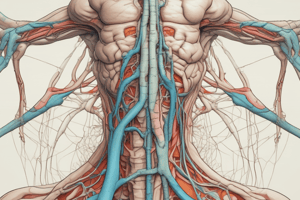Podcast
Questions and Answers
What is the primary role of the lymphatic system in edema development?
What is the primary role of the lymphatic system in edema development?
- To transport oxygen to tissues
- To filter toxins from the bloodstream
- To produce red blood cells
- To maintain fluid balance in the body (correct)
What do lymph capillaries primarily collect?
What do lymph capillaries primarily collect?
- Carbon dioxide waste
- Excess interstitial fluid (correct)
- Oxygen from blood
- Nutrients from digested food
What happens to lymph after it is filtered through lymph nodes?
What happens to lymph after it is filtered through lymph nodes?
- It is converted to blood
- It becomes interstitial fluid
- It is returned to the heart
- It travels to the lymphatic ducts (correct)
What can occur if the lymphatic system is damaged or blocked?
What can occur if the lymphatic system is damaged or blocked?
Where does lymph eventually drain into after passing through the lymphatic ducts?
Where does lymph eventually drain into after passing through the lymphatic ducts?
What condition can contribute to edema by increasing blood vessel permeability?
What condition can contribute to edema by increasing blood vessel permeability?
What is the first step in the pathway of lymph?
What is the first step in the pathway of lymph?
Why is understanding the lymphatic system's role in edema important?
Why is understanding the lymphatic system's role in edema important?
Flashcards
What is the role of the lymphatic system in fluid balance?
What is the role of the lymphatic system in fluid balance?
The lymphatic system plays a crucial role in preventing edema by collecting excess fluid and proteins from tissues and returning them to the bloodstream.
What are lymph capillaries?
What are lymph capillaries?
These tiny, blind-ended vessels in the interstitial space collect excess interstitial fluid, which then becomes lymph.
How does lymph travel throughout the body?
How does lymph travel throughout the body?
Lymph travels through a network of vessels and nodes, where it's filtered to remove any pathogens or foreign substances.
What are lymphatic ducts?
What are lymphatic ducts?
Signup and view all the flashcards
How does the lymphatic system impact edema?
How does the lymphatic system impact edema?
Signup and view all the flashcards
How do conditions like diabetes and hypertension affect edema?
How do conditions like diabetes and hypertension affect edema?
Signup and view all the flashcards
What is the origin of lymph?
What is the origin of lymph?
Signup and view all the flashcards
What is the pathway of lymph?
What is the pathway of lymph?
Signup and view all the flashcards
Study Notes
Student Information
- Name: Adan Munir
- Student ID: 70140701
- Department: BVS
- Semester: 5th
Lymphatic System in Edema Development
- Role in Fluid Balance: The lymphatic system maintains fluid balance by collecting excess fluid and proteins from tissues, returning them to the bloodstream.
- Lymph Capillaries: Tiny, blind-ended vessels in interstitial spaces collect fluid, becoming lymph.
- Lymph Transport: Lymph travels through vessels and lymph nodes. Lymph nodes filter lymph, removing pathogens and foreign substances.
- Lymphatic Ducts: Lymph eventually reaches lymphatic ducts, draining into the bloodstream.
Lymphatic System in Edema Resolution
- Proper Functioning: A functioning lymphatic system prevents fluid accumulation in tissues, thus preventing edema.
- Damaged System: A damaged or blocked lymphatic system allows fluid buildup in tissues, leading to edema.
- Pathway of Lymph: Interstitial fluid, originating from the surrounding cells, is collected by lymph capillaries.
- Lymph Vessels & Lymph Nodes: Lymph travels through vessels, reaching lymph nodes where it is filtered.
- Lymphatic Ducts: Filtered lymph finally enters lymphatic ducts, returning to the bloodstream.
Impact of Conditions on Edema
- Conditions contributing to edema: Conditions like diabetes and hypertension can damage blood vessels, increasing their permeability, allowing fluid to leak into tissues.
- Significance of Understanding Lymphatic System: Understanding the lymphatic system's role in edema development and resolution is essential for managing and treating the condition effectively.
- Clarity on Lymphatic System's Role: The lymphatic system plays a crucial role in edema development, helping maintain fluid balance within the body.
Studying That Suits You
Use AI to generate personalized quizzes and flashcards to suit your learning preferences.




